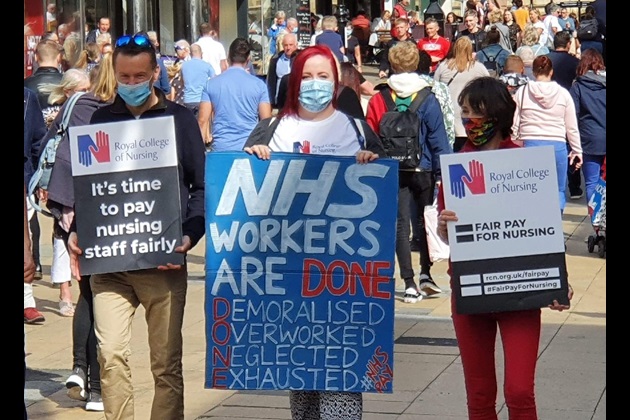North Lincolnshire branch chair Mel Kerr’s been busy spreading the word about our pay campaign. She explains what drives her and what tactics have proved effective
Why do you feel so passionately about fair pay for nursing?
Nursing has always been underpaid in my opinion. Our pay rises were capped at 1% for eight years, then the pay deal we got in 2018 proved to be inadequate because our pay rises remained below the rate of inflation.
When the government announced a pay rise for other public sector workers in July, it was breaking point for me. The fact that it was framed as a “thank you” for their efforts during COVID-19, with no mention of NHS staff, rubbed salt in the wounds.
I know we’re not due our pay review until next year, but that’s what this campaign is all about – demanding that those discussions are brought forward so we can receive a meaningful, early pay rise.
What have you done locally to raise awareness of the campaign?
I’ve taken to social media and am sharing, sharing, sharing. Anything the RCN and its elected members put out there – videos, infographics, statistics – I share on my branch Facebook and Twitter feeds. I’ve also put my own videos out there, explaining why it’s important to be active in the campaign.
I’ve helped organise local protests, too. There have been ones in August and September, with another planned in October. I’ve been a key speaker at each.
What has the response been like?
It’s been good. Very positive and supportive, which is really encouraging. There has been the odd negative comment, not helped by misleading facts and figures released by the government, but that hasn’t got in the way of my passion and determination to make this campaign successful.
Is there anything you say that particularly resonates with the public?
I do share the odd personal story of looking after patients during COVID-19, which tends to strike a chord with people. But more than anything, I try to help the public understand the facts.
The fact that we’ve had a real terms pay cut over the past decade. The fact that there are more than 40,000 nursing vacancies in the NHS in England. The fact that students have to pay to do a nursing degree and qualify with a crushing debt. And the fact that we’re haemorrhaging staff because we can’t make this a desirable job to enter, let alone stay in. A meaningful pay rise would help address all these issues.
Photo below: Mel (centre) at a local pay protest
We need to be vocal, every one of us, and campaign for what we deserve
What has worked and not worked?
The first protest I was involved in went on a slight tangent, so I would say it’s important to remain focused on your main goal and have plenty of time to organise. Personal stories and powerful speakers are important, as is having flyers and being really visible on social media. Nursing staff can be tentative and nervous about campaigning on pay, but as my mum used to say, you have to be in it to win it, and that’s my mentality.
How do you think this campaign will be won?
It’s about the numbers. We must get more people involved. The public is on our side, so we need to support them to be active too. We need to be vocal, every one of us, and campaign for what we deserve.
It won’t come easily, but we must force the government to stop and listen to what the health care workforce is asking for because honestly, we’re on our knees. We’re crying out for a meaningful pay rise that recognises the true skill, responsibility and knowledge of nursing staff who hold up the NHS.
How do you start a conversation with nursing staff about pay?
I always open with the leading question: do you feel you get fair and equal pay for the job you do? The majority of the time the answer is no, then I take it from there. I ask why they don’t feel their pay is fair, what they want, and explain how they can be part of campaigning for change.
How do you see the RCN’s pay and safe staffing campaigns as linked?
The two go hand in hand. If you can’t get the nurses, then you’re going to have a failing system. But you need to pay nursing staff the right amount to recruit and retain them to help fix the system.
What are your top tips for other active members keen to campaign?
- Understand the needs of your local membership, and cater to them, so you can support members to actively campaign with you.
- Publicise what you’re doing, spread the word in your workplace, and be active on social media.
- Let your region know what you’re doing, seek advice from your communications officer and plan ahead with enough time to make sure your local activity has the biggest impact.
- Think of a provocative theme or catch phrase for your local activity so that it sticks in the minds of members and the public.
Campaign resources
- Download our campaign leaflet for RCN reps.
- We’ve developed materials including badges, window stickers and placards to help you spread the word, initiate conversations and build support. Order your campaigning materials.
- To download posters for your workplace, visit our Fair Pay For Nursing page. Reps can also find poster templates in our Portal for Online Design. Find the link in the RCN Reps Hub.
- Don't forget, if you’re an RCN rep, you can also find useful resources, including tools to help you talk about the campaign, on our online resource for reps ‘Talking about pay’. Use your MyRCN details to log into our online learning portal or use the link in the RCN Reps Hub.








